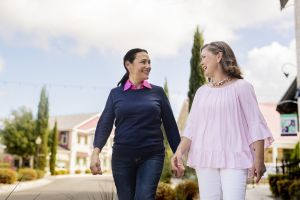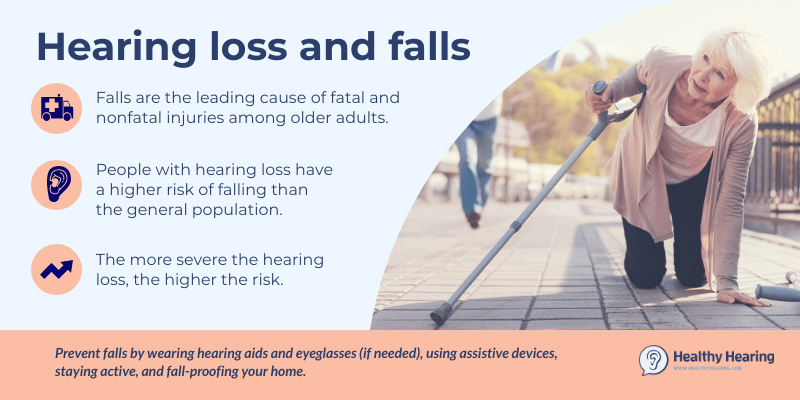|
www.HealthyHearing.com |
Hearing loss and falls: Why they're connectedNew study finds hearing aids are linked to a lower fall risk in older adults
Contributed by Temma Ehrenfeld A growing body of research suggests that hearing loss contributes to falls, but that hearing aids can be a useful prevenative tool. For older people, falls are a big fear. As we age, our hearing and balance naturally decline. More than one in four Americans age 65 or older falls every year, the Centers for Disease Control and Prevention (CDC) reports. Even if you’re not hurt, a tumble is frightening. People tend to retreat to their chairs, which sets off a bad cycle: You move less, you become weaker, and are more likely to fall again. Here’s a simple test of your risk: Stand on one leg. In a small study of women in their 70s, the chance of a hip fracture dropped by 5 percent for every second they could stand on one leg with their eyes open. Hearing and balance: How they're connectedHow does hearing fit in? In the ear, balance and hearing are directly connected, sharing a common nerve pathway to the brain. What you hear (and don’t hear) directly affects your balance, according to a research overview led by Anat Lubetzky, PhD, assistant professor in the Physical Therapy Department at New York University, with a team at New York Eye and Ear Infirmary. This is especially important if your balance isn’t the best. “Most of us in the field believe that people with poor balance benefit a lot from auditory cues,” says Timothy Hullar, MD, a professor of otolaryngology at Oregon Health and Science University.
Why hearing loss mattersA 25-decibel hearing loss—equivalent to going from normal to mild hearing loss—triples your chance of falling according to a study of people aged 40 to 69. That’s when hearing loss often first develops and you’re less likely to guard against falls. Another study, from a team at the University of Michigan, analyzed data on nearly 115,000 seniors newly diagnosed with hearing loss (but otherwise healthy). It found that 13 percent had an injury in a fall within three years, compared to 7.5 percent of the general population their age. Reasons hearing loss may increase risk of falling1. Hearing taps your brain reserves.If you’re concentrating harder to interpret sound, you may have less mental resource available for balance. "Gait and balance are things most people take for granted, but they are actually very cognitively demanding," says otologist Frank Lin, MD, PhD, from the Johns Hopkins School of Medicine. 2. Aging affects both hearing and balance.Age-related hearing loss may be linked to declines in the vestibular sense, a set of receptors in your inner ear, which comes into play whenever you move your head. It’s also activated by the downward force of gravity, giving you a sense of where you are: your grounding. If you’ve ever had an infection of the inner ear, you’ll recall you were dizzy. However, you don’t need to be dizzy to have vestibular issues. Some evidence suggests the vestibular sense may begin to decline at about the age of 40. More than a third of all Americans older than 40 are unable to pass a balance test—standing on foam with their eyes closed—that is linked to a higher risk of falling. (To test your balance, check out this test.) Loud low-frequency sounds (think pounding drums) may damage the inner ear, over time affecting our balance (and hearing). To be clear, age-related hearing loss and inner ear problems are not the same thing and don't always occur simultaneously. “Many people with vestibular disorders have excellent hearing and not all people with hearing loss will have vestibular weakness,” Lubetzky told me. 3. Sounds help us balance.If you try to balance on one leg in a yoga class, for example, your teacher will tell you to stare at one spot. Stable sounds may work the same way, Lubetzky explained, as a kind of “auditory anchor.” But you have to hear them. This process may be especially important if you have hearing loss. For example, when people with hearing loss hear stable background sounds, their posture improves. Balance arises from the contributions of several senses: vision, the coordination between our head and our eyes, our muscle and joint coordination—and, possibly, what we hear. 4. Hearing loss is linked to mood.People may be less alert when caught up in a fog of misery or anxiety. Hearing loss increases the risk of depression. Depression is linked to more falls and those falls tend to deepen depression in another classic bad cycle. Do hearing aids help prevent falls?Most likely. A 2023 study shows that consistent use of hearing aids is associated with a lower risk of experiencing a fall in older adults with hearing loss. The research was conducted by University of Colorado-Anschutz Medical Campus. The University of Michigan study found that a first-time hearing aid cut the risk of a fall-related injury by 13 percentage points in the next three years. It’s possible that treating “hearing loss (with hearing aids or other implants) serves as a type of 'balance aid' like a cane," says otolaryngologist Maura Cosetti, MD, co-author of the New York Eye and Ear Infirmary study. The bottom line: If you’re concerned about your balance and you have hearing loss, hearing better may make a difference. How to prevent fallsKeep moving. Walking, balance exercises and resistance exercises to strengthen muscles can keep seniors on their feet. You can build strength and improve your balance in as little as two 15-20 minute sessions a week, Finnish researchers report. 
helps keep your sense of balance healthy. Tai-chi classes, an ancient Chinese practice, are popular among older people. An hour of tai chi from one to three times a week can cut the risk of a bad fall by half, according to a review of 10 randomized controlled trials. The National Council on Aging recommends a program called “Tai Chi for arthritis” for older people. You may feel more comfortable in a tai chi (or any kind of class) if you can easily hear the teacher and converse with other students. Or consider a water aerobics class. If you do fall, strength-training will make you less to break a bone. Working out with resistance bands or weights or doing resistance exercises makes your bones denser and therefore stronger, which is important since hearing loss is also linked to osteoporosis. Squats, for example, built bone mass in a group of post-menopausal women with deteriorating bones in one study. Keep in mind it's a great idea to wear your hearing aids when exercising, too. When did you have your last eye checkup? Tint-changing lenses and bifocals are less appropriate for older people and you may need to change prescriptions. Another reason to keep up-to-date on vision loss? Studies indicate hearing and vision loss—known as dual sensory impairment—equals 'substantial' risk for dementia. Consider physical therapy, if you or your older loved one have trouble walking or getting up from a chair. Lastly and perhaps most importantly, fall proof your home. Have you done a walk-through, making sure that the bottom and top of all stairs are well-lit and the carpeting and railing secure? Secure any loose carpeting, especially in hallways. Install grab bars near the toilet and bath or shower. Temma EhrenfeldTemma Ehrenfeld is an award-winning journalist who covers psychology and health. Her work has appeared in major newspapers, magazines and websites. You can find more of her writing at her Psychology Today blog, Open Gently. Read more about Temma. |
Featured clinics near me
Earzlink Hearing Care - Reynoldsburg
7668 Slate Ridge Blvd
Reynoldsburg, OH 43068

Find a clinic
We have more hearing clinic reviews than any other site!


